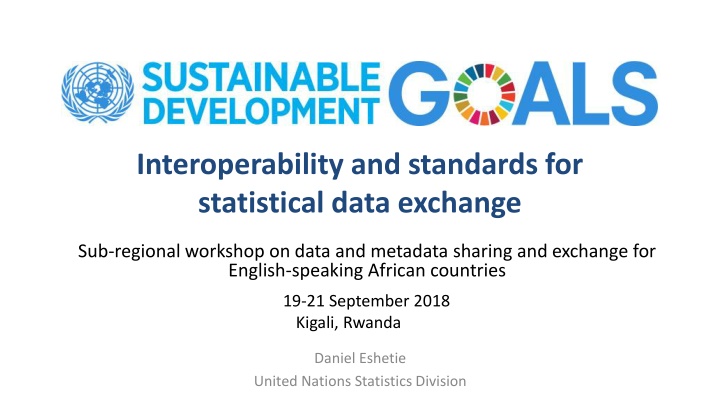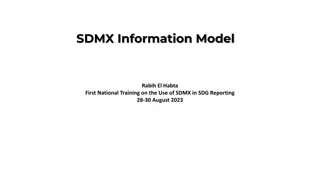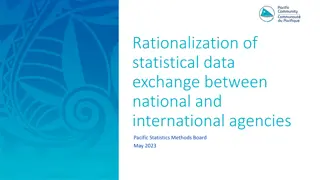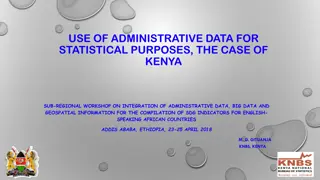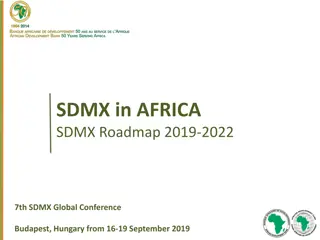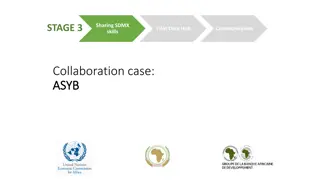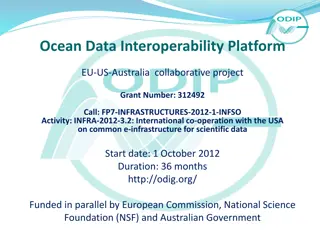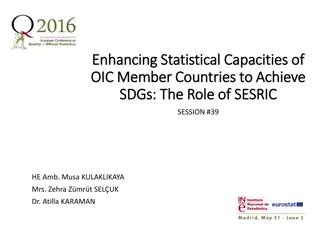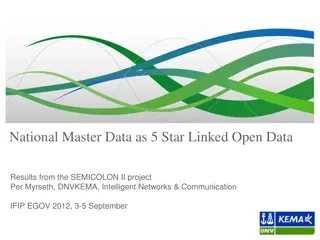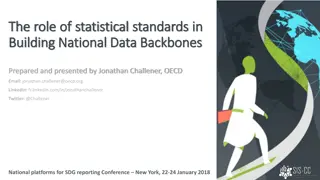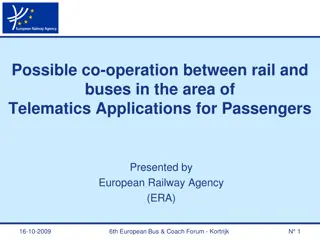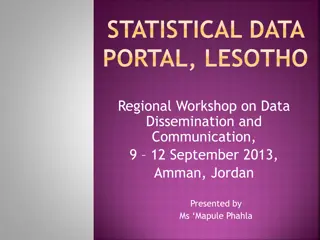Enhancing Statistical Data Exchange and Interoperability in African Countries
Sub-regional workshop in Kigali focused on the challenges and importance of modernizing statistical data exchange and dissemination in African countries. The Cape Town Global Action Plan emphasizes the need for innovation and modernization of national statistical systems, including the development of standardized structures and promotion of interoperability for improved data sharing.
Download Presentation

Please find below an Image/Link to download the presentation.
The content on the website is provided AS IS for your information and personal use only. It may not be sold, licensed, or shared on other websites without obtaining consent from the author.If you encounter any issues during the download, it is possible that the publisher has removed the file from their server.
You are allowed to download the files provided on this website for personal or commercial use, subject to the condition that they are used lawfully. All files are the property of their respective owners.
The content on the website is provided AS IS for your information and personal use only. It may not be sold, licensed, or shared on other websites without obtaining consent from the author.
E N D
Presentation Transcript
Interoperability and standards for statistical data exchange Sub-regional workshop on data and metadata sharing and exchange for English-speaking African countries 19-21 September 2018 Kigali, Rwanda Daniel Eshetie United Nations Statistics Division
MODERNIZING STATISTICAL DATA EXCHANGE AND DISSEMINATION
Challenge of modernizing statistical data exchange and dissemination Statistical organizations strive to modernize their entire business processes, from data collection to dissemination They face distinct resource constraints and operate in many different types institutional environments There is need to build new systems on what already exists, often relying on legacy systems that need to be maintained
Cape Town Global Action Plan for Sustainable Development Data Provides a framework for planning and implementing statistical capacity building Calls the global statistical community to take decisive actions to transform how data and statistics are produced and disseminated In particular, underlines the need for improved data interoperability to address the information demands of the 2030 Agenda
Cape Town Global Action Plan for Sustainable Development Data Strategic Area 2: Innovation and modernization of national statistical systems Objective 2.1: Modernize governance and institutional frameworks to allow national statistical systems to meet the demands and opportunities of constantly evolving data ecosystems enhanced data sharing across the NSS improve transparency of, and public access to, official statistics
Cape Town Global Action Plan for Sustainable Development Data Strategic Area 2: Innovation and modernization of national statistical systems Objective 2.2: Modernize statistical standards, particularly those aimed to facilitate data integration and automation of data exchange across different stages of the statistical production process Define and implement standardized structures for the exchange and integration of data and metadata Promote interoperability
Cape Town Global Action Plan for Sustainable Development Data Strategic Area 2: Innovation and modernization of national statistical systems Objective 2.2: Facilitate the application of new technologies and new data sources into mainstream statistical activities Identify specifications for interoperable, open source technologies Promote the development of integrated database systems https://unstats.un.org/sdgs/hlg/cape-town-global-action-plan/
Data interoperability challenge Organizations often develop and maintain fragmented data production and dissemination systems to meet the needs of different internal and external constituencies disparate protocols for data exchange proprietary technological platforms diverse data models, classifications, file formats This makes it very difficult to integrate the wealth of data that is available across organizational boundaries
Interoperability Ability to: Search many data collections in a single query Exchange data across computer systems using standard data formats and communication protocols Automatically and unambiguously interpret the meaning of the information exchanged Integrate multiple data assets into coherent information products
Key enablers of data interoperability Technology standards Allow system components developed and maintained by multiple parties to be seamlessly integrated and to work together Enable multi-lateral exchange and use, in contrast to bi-lateral exchange where an agreement needs to be reached between each pair of parties, or the data consumer needs to adapt to the practices and standards of each data provider
Key enablers of data interoperability Common (high-level) data and metadata models Help formalize the description of data and metadata objects in a consistent way across disparate systems Common vocabularies and classifications Ensure there is no ambiguity regarding the information content of data services provided by different sources
Key enablers of data interoperability Geographic information systems (GIS) Enable multiple data items to be linked by location and analysed using the description of geographically-related features Application Programming Interfaces (APIs) Help extend and integrate various data and software components by allowing users to link data and processes from multiple sources. Facilitate the discovery of new uses for existing data assets and make them easily available to external third-party developers
COLLABORATIVE ON DATA INTEROPERABILITY
Collaborative on SDG Data Interoperability On 17 January 2017, at the first UN World Data Forum in Cape Town, South Africa, the Global Partnership for Sustainable Development Data (GPSDD) and the United Nations Statistics Division (UNSD) convened a meeting on the theme of Advancing SDG Data Interoperability A multi-stakeholder meeting on data interoperability for the SDGs, on 5 March 2017 in New York, established a new Collaborative on SDG Data Interoperability
Collaborative on SDG Data Interoperability Objectives Connect: create a virtual space for stakeholders across constituencies to come together Experiment: foster an environment in which new solutions to interoperability challenges are experimented with and prototypes jointly developed Learn: build and catalogue a body of knowledge, lessons and stories on the success, replicability and scalability of data interoperability solutions Advocate: raise awareness among stakeholders about how data interoperability can help meet and monitor the SDGs
Collaborative on SDG Data Interoperability Deliverables (to be presented at the second UNWDF in Dubai) Technical Interoperability Guide Hands-on recommendations to improve data interoperability within and across organizational boundaries Policy Brief Document to highlight the benefits that interoperable solutions can impart for decision-makers, contributing to efforts making the case for investments in data for development
